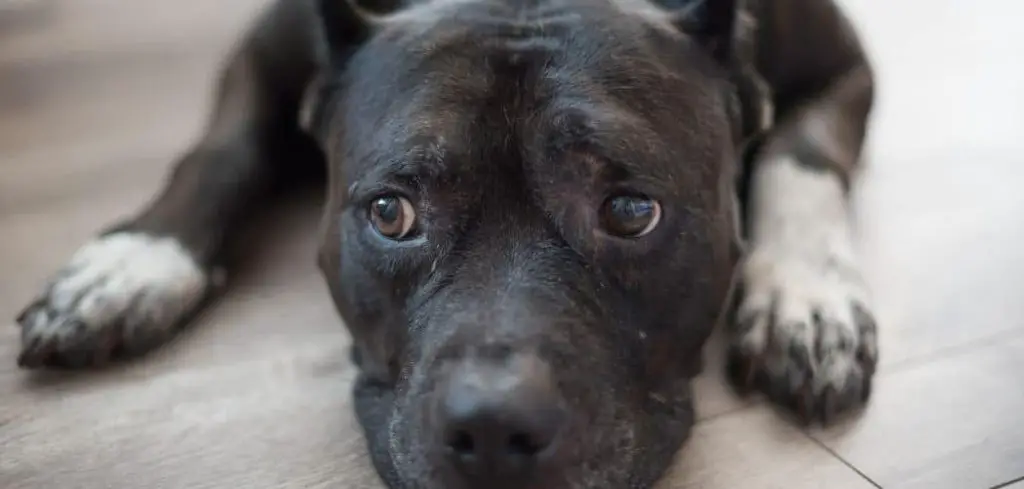Diarrhea combined with frequent urination in an old dog is a concerning set of symptoms that often points to underlying health problems rather than a simple stomach upset.
Because senior dogs are more prone to organ-related conditions, these signs should not be ignored.
We outline the common causes of diarrhea and increased urination in old dogs, what you can do at home, and when to seek veterinary help.
Old Dog Diarrhea and Peeing a Lot — Why It Happens
When an old dog has diarrhea and pees a lot, it may be due to kidney disease, diabetes, infections, or hormonal imbalances. Sometimes digestive upset and increased thirst lead to both symptoms occurring together. In other cases, more serious systemic diseases like Cushing’s disease or organ failure are responsible.
Because both diarrhea and increased urination cause significant fluid loss, dehydration can quickly develop, making prompt attention essential.

Old Dog Diarrhea and Peeing a Lot: Common Causes
Kidney Disease
Kidney disease is one of the most common illnesses in senior dogs. When the kidneys cannot filter waste properly, toxins build up in the bloodstream, often leading to digestive issues such as diarrhea.
At the same time, kidney problems cause dogs to drink and urinate more in an attempt to flush out toxins. Owners may notice accidents in the house, large puddles of urine, and lethargy.
Left untreated, kidney disease progresses and can become life-threatening, so early veterinary care is critical.
Read more: Old Dog Diarrhea and Vomiting Yellow (What it means)
Diabetes
Diabetes affects a dog’s ability to regulate blood sugar. In older dogs, uncontrolled diabetes can trigger excessive thirst and urination, along with digestive issues like diarrhea or weight loss.
You may also notice increased appetite at first, followed by weakness, dull coat, and changes in energy levels.
Because diabetes requires ongoing management with insulin and dietary adjustments, veterinary diagnosis and treatment are necessary.
Urinary Tract Infections (UTIs)
UTIs are common in senior dogs and often cause frequent urination. When combined with diarrhea, it can look like a general illness, but the urinary system may be the main problem.
Signs of a UTI include straining to urinate, blood in the urine, strong-smelling urine, or accidents indoors. Some dogs may lick their genital area more frequently.
Without treatment, infections can spread to the kidneys, making them more dangerous for older dogs.
Cushing’s Disease
Cushing’s disease is caused by an overproduction of cortisol, often due to adrenal or pituitary gland tumors. It frequently affects senior dogs.
Excess cortisol leads to increased urination and thirst. It can also weaken the immune system and digestive tract, resulting in diarrhea, thin skin, and hair loss.
Since Cushing’s disease develops gradually, many owners miss the early signs until multiple symptoms appear together.
Liver Disease
Liver dysfunction can upset digestion, leading to diarrhea, and also disrupt hormone and fluid balance in the body. As a result, dogs may urinate more often and struggle with accidents indoors.
Other signs of liver disease include jaundice (yellowing of the gums or eyes), vomiting, and weight loss.
Because the liver is essential for detoxifying the body, liver-related illness in senior dogs is always serious.
Dietary Indiscretion Combined With Age-Related Weakness
Sometimes, an old dog’s diarrhea may simply be due to eating spoiled food, garbage, or something unusual. However, when combined with age-related hormonal imbalances or kidney strain, excessive urination can occur at the same time.
While this cause is less severe than systemic diseases, dehydration is still a risk, and recurring episodes should always be checked by a vet.
Read more: Old Dog Diarrhea and Losing Weight (Causes explained)
What to Do If Your Old Dog Has Diarrhea and Is Peeing a Lot
At home, your first goal is to prevent dehydration. Offer plenty of fresh, clean water, and encourage your dog to drink small amounts frequently.
If your dog can keep food down, switch temporarily to a bland diet such as boiled chicken and rice to ease digestive upset. Feed smaller meals more often rather than large portions.
Make sure your dog has easy access to outdoor areas or puppy pads indoors to reduce stress from accidents. Older dogs may feel anxious if they can’t control their bladder or bowels.
Keep your senior dog comfortable in a quiet environment and monitor for changes in energy, appetite, and behavior. If the symptoms persist beyond 24 hours, worsen, or occur alongside other concerning signs, veterinary care is essential.
When to Call or Visit Your Vet
You should contact your vet immediately if your old dog’s diarrhea is severe, watery, or contains blood.
Frequent urination combined with lethargy, vomiting, or refusal to eat can indicate serious conditions like diabetes or kidney failure.
If your dog seems disoriented, loses weight rapidly, or develops jaundice, these are urgent warning signs requiring prompt evaluation.
Even if the symptoms seem mild, diarrhea and excessive urination together can quickly deplete an older dog’s fluids and strength, so timely veterinary care is always the safest approach.
Related: Old Dog Diarrhea (Causes and when to worry)
Key Takeaway
Diarrhea and peeing a lot in an old dog can signal serious underlying conditions like kidney disease, diabetes, Cushing’s disease, or infections.
While mild cases may stem from diet, persistent symptoms in senior dogs require professional care.
Provide fresh water, bland food, and comfort at home, but always seek veterinary help if the problem lasts more than a day or is accompanied by other warning signs.
With timely attention, many of these conditions can be managed, allowing your dog to stay comfortable and enjoy their golden years.
